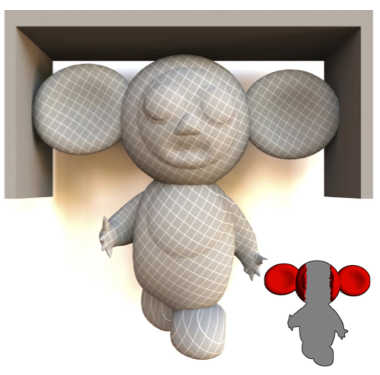
 |
 |
Subspace Condensation: Full Space Adaptivity for Subspace Deformations Yun Teng, Mark Meyer, Tony DeRose, Theodore Kim May 2015 Subspace deformable body simulations can be very fast, but can behave unrealistically when behaviors outside the prescribed subspace, such as novel external collisions, are encountered. We address this limitation by presenting a fast, flexible new method that allows full space computation to be activated in the neighborhood of novel events ... more Paper (PDF) Additional materials: [paper_0089.mov] To appear in SIGGRAPH 2015. Available as Pixar Technical Memo #15-03 |
 |
Compressing Fluid Subspaces Aaron Demby-Jones, Pradeep Sen, Theodore Kim May 2016 Subspace fluid simulations, also known as reduced-order simulations, can be extremely fast, but also require basis matrices that consume an enormous amount of memory. Motivated by the extreme sparsity of Laplacian eigenfunctions in the frequency domain, we design a frequency-space codec that is capable of compressing basis matrices by up ... more Paper (PDF) |
 |
Dispersion Kernels for Water Wave Simulation Jose Angel Canabal, David Miraut, Nils Thuerey, Theodore Kim, Javier Portilla, Miguel Otaduy December 2016 We propose a method to simulate the rich, scale-dependent dynamics of water waves. Our method preserves the dispersion properties of real waves, yet it supports interactions with obstacles and is computationally efficient. Fundamentally, it computes wave accelerations by way of applying a dispersion kernel as a spatially variant filter, which ... more Paper (PDF) |
 |
Eulerian Solid-Fluid Coupling Yun Teng, David I.W. Levin, Theodore Kim December 2016 We present a new method that achieves a two-way coupling between deformable solids and an incompressible fluid where the underlying geometric representation is entirely Eulerian. Using the recently developed Eulerian Solids approach [Levin et al. 2011], we are able to simulate multiple solids undergoing complex, frictional contact while simultaneously interacting ... more Paper (PDF) |
 |
Stable Neo-Hookean Flesh Simulation Breannan Smith, Fernando de Goes, Theodore Kim December 2017 Non-linear hyperelastic energies play a key role in capturing the fleshy appearance of virtual characters. Real-world, volume-preserving biological tissues have Poisson's ratios near 1/2, but numerical simulation within this regime is notoriously challenging. In order to robustly capture these visual characteristics, we present a novel version of Neo-Hookean elasticity. Our ... more Paper (PDF) Video Additional materials: [snh_code.tar.bz2], [stable_neo_hookean_supplement.pdf] Errata: The expression for alpha on the last line of Page 4 contained a typo that we have fixed. |
 |
Clean Cloth Inputs: Removing Character Self-Intersections With Volume Simulation Audrey Wong, David Eberle, Theodore Kim August 2018 Simulation artists frequently work with characters that self-intersect. When these characters are sent as inputs to a cloth simulator, the results can often contain terrible artifacts that must be addressed by tediously sculpting either the input characters or the output cloth. In this talk, we apply volume simulation to character ... more Paper (PDF) |
 |
Example-based Turbulence Style Transfer Syuhei Sato, Yoshinori Dobashi, Theodore Kim, Tomoyuki Nishita August 2018 Generating realistic fluid simulations remains computationally expensive, and animators can expend enormous effort trying to achieve a desired motion. To reduce such costs, several methods have been developed in which high-resolution turbulence is synthesized as a post process. Since global motion can then be obtained using a fast, low-resolution simulation, ... more Paper (PDF) Additional materials: [FluidStyleTransfer.mp4], [FluidStyleTransfer_Supplemental.mp4] |
 |
Robust Skin Simulation in Incredibles 2 Ryan Kautzman, Gordon Cameron, Theodore Kim August 2018 Robustly simulating the dynamics of skin sliding over a character's body is an ongoing challenge. Skin can become non-physically "snagged" in curved or creased regions, such as armpits, and create unusable results. These problems usually arise when it becomes ambiguous which kinematic surface the skin should be sliding along. We ... more Paper (PDF) |
 |
Scalable Laplacian Eigenfluids Qiaodong Cui, Pradeep Sen, Theodore Kim August 2018 The Laplacian Eigenfunction method for fluid simulation, which we refer to as Eigenfluids, introduced an elegant new way to capture intricate fluid flows with near-zero viscosity. However, the approach does not scale well, as the memory cost grows prohibitively with the number of eigenfunctions. The method also lacks generality, because ... more Paper (PDF) Additional materials: [ScalableEigenFluidMainVideo.mp4], [ScalableEigenFluidSupplementalVideo.mp4], [supplement.pdf] |
 |
Analytic Eigensystems for Isotropic Distortion Energies Breannan Smith, Fernando de Goes, Theodore Kim September 2018 Many strategies exist for optimizing non-linear distortion energies in geometry and physics applications, but devising an approach that achieves the convergence promised by Newton-type methods remains challenging. In order to guarantee the positive semi-definiteness required by these methods, a numerical eigendecomposition or approximate regularization is usually needed. In this paper, ... more Paper (PDF) Additional materials: [Matlab.zip], [movie.mov], [supplement.pdf] |
 |
Anisotropic Elasticity for Inversion-Safety and Element Rehabilitation Theodore Kim, Fernando de Goes, Hayley Iben July 2019 We present an analysis of anisotropic hyperelasticity, specifically transverse isotropy, that obtains closed-form expressions for the eigendecompositions of many common energies. We then use these to build fast and concise Newton implementations. We leverage our analysis in two separate applications. First, we show that existing anisotropic energies are not inversion-safe, ... more Paper (PDF) Video Additional materials: [Anisotropy2019_supplement.pdf], [matlab.zip] |
 |
Dynamic Deformables: Implementation and Production Practicalities Theodore Kim, David Eberle July 2020 Simulating dynamic deformation has been an integral component of Pixar's storytelling since Boo's shirt in Monsters, Inc. (2001). Recently, several key transformations have been applied to Pixar's core simulator Fizt that improve its speed, robustness, and generality. Starting with Coco (2017), improved collision detection and response were incorporated into the ... more Paper (PDF) Video Additional materials: [code.zip] |